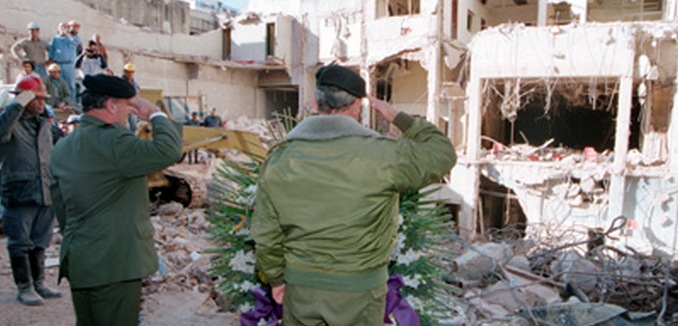It was reported Friday that an Argentinian court struck down as unconstitutional a controversial agreement between between the Argentinian government and the government of Iran to establish a joint “truth commission” to investigate the 1994 bombing at the Asociación Mutual Israelita Argentina (AMIA), a Jewish community center in Buenos Aires. The controversy arose because members of Iran’s ruling class have been implicated in the attack. Argentina’s government intends to appeal the ruling.
Alberto Nisman, a prosecutor who oversaw an investigation of the AMIA center explosion that killed 85 people, had argued in his appeal to the court that in negotiating the 2013 deal with Iran, the executive branch had overstepped into areas reserved for the judiciary.
Thursday’s ruling declared the agreement unconstitutional and ordered Argentina not to go ahead with it. The deal had been delayed anyway by Iranian reluctance to move forward in implementing it.
In 2007, Interpol issued arrest warrants for six suspects, including five Iranians. Iran has consistently refused to allow Argentina to interrogate the suspects. The “truth commission” was sold by Argentina’s government as a means of getting to the truth. But critics say that it will help Iran evade the consequences of its actions.
Senators Kirsten Gillibrand (D-NY) and Mark Kirk (R-IL) wrote a letter to Argentine President Cristina Fernandez de Kirchner blasting the decision to establish the “truth commission.”
It is critically important to maintain the indictment against the Iranian perpetrators as it provides the basis for current Interpol red notices. That is why we find it so disturbing that on January 27, 2013, you announced that Argentina and Iran will jointly establish an extrajudicial “Truth Commission” to “re-investigate” the bombing – even though the truth in this matter has already been meticulously established in Argentine courts. The Argentine Congress narrowly approved the “commission” on February 28, 2013.
The extrication of this case from that legal process represents a clear opportunity for Iran to undo the Argentine indictments against its senior officials. If charges against senior Iranian officials were dropped, it would be an affront to both the victims of the attack and to their bereaved families. Guillermo Borger, the current president of the AMIA, has warned that the precedent of allowing the Iranian regime to evade responsibility for its crimes might even encourage another devastating attack.
Two weeks ago, the State Department issued a report accusing Iran of being a state sponsor of terrorism. The report prompted AP reporter Matt Lee to observe that State had “singled out Iran as a major state sponsor of terrorism that continues to defy demands it prove its atomic ambitions are peaceful even as Washington pursues negotiations with Tehran over its nuclear program.”
For more on Iran’s efforts to expand its reach around the world, read Armin Rosen’s Desperate For Allies and Secret Assets, Iran Penetrates Africa in the August 2013 issue of The Tower Magazine.
[Photo: Israel Defense Forces / Flickr ]




